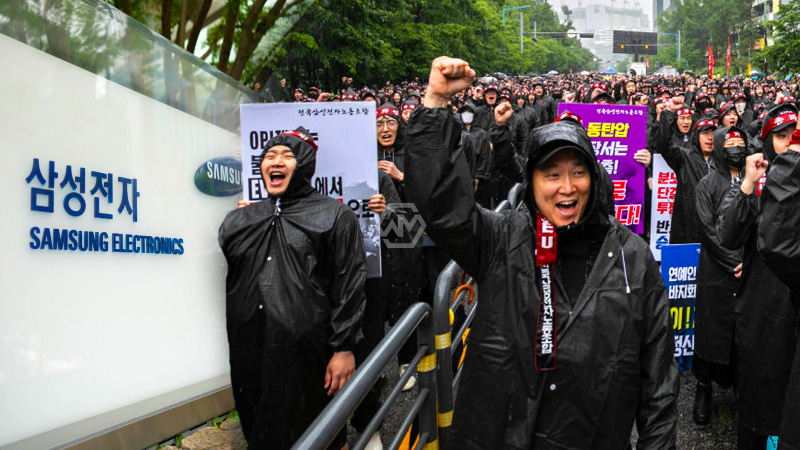- National Samsung Electronics Union (NSEU) demands 3.5% pay raise and extra holiday.
- Initial strike began on Monday, now extended indefinitely due to stalled negotiations.
- Samsung claims no production disruptions, while union reports some impact.
The National Samsung Electronics Union (NSEU) in South Korea has extended its strike indefinitely following failed negotiations with management over pay and working conditions. The union, which began its walkout on Monday, demands a 3.5% basic pay increase and an additional day’s holiday.
Samsung, the world’s largest memory chip maker, is currently enjoying a surge in profits driven by rising semiconductor prices and the global AI boom. Despite this financial upswing, the company has only offered a 3% pay increase, and no talks have occurred since the strike began.
Samsung Workers Extend Strike as Pay Negotiations Stall
The indefinite strike by the National Samsung Electronics Union (NSEU) underscores the significant tension between Samsung management and its workforce. Originally planned as a short-term action, the strike began on Monday but has now been extended indefinitely due to a lack of progress in negotiations. The union’s primary demands include a 3.5% pay raise and an additional holiday, reflecting broader concerns about worker compensation and conditions within the company.
Samsung’s response has been to assert that production remains unaffected by the strike, despite claims to the contrary from the union. The company, benefiting from a global surge in semiconductor demand and a booming AI sector, reported a significant increase in profits, which has only heightened worker expectations for better pay. However, the management’s offer of a 3% pay increase has been deemed insufficient by the union, leading to an impasse.
Union vice-president Lee Hyun-kuk has criticized the lack of engagement from Samsung’s management, noting that there have been no talks since the strike’s inception. This has fueled the union’s resolve to continue its actions and encourage more members to participate. The union aims to raise awareness among workers and the public about the importance of their cause, emphasizing that improved pay and conditions are vital for sustaining worker morale and productivity.
As the strike continues, it places additional pressure on Samsung to address the demands of its workforce. The situation also serves as a reminder of the broader labor issues within the tech industry, where rapid technological advancements and significant profit margins often contrast sharply with the conditions experienced by workers on the ground. The outcome of this dispute could set an important precedent for labor relations within the sector.
The ongoing strike at Samsung highlights a crucial standoff between labor and management in the tech industry. As the union persists in its demands for better pay and conditions, the resolution of this conflict will be closely watched for its broader implications on worker rights and corporate practices.
“Samsung Electronics will ensure no disruptions occur in the production lines.” – Samsung’s statement in response to the union strike.



